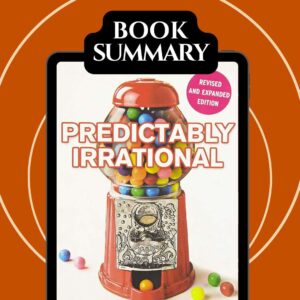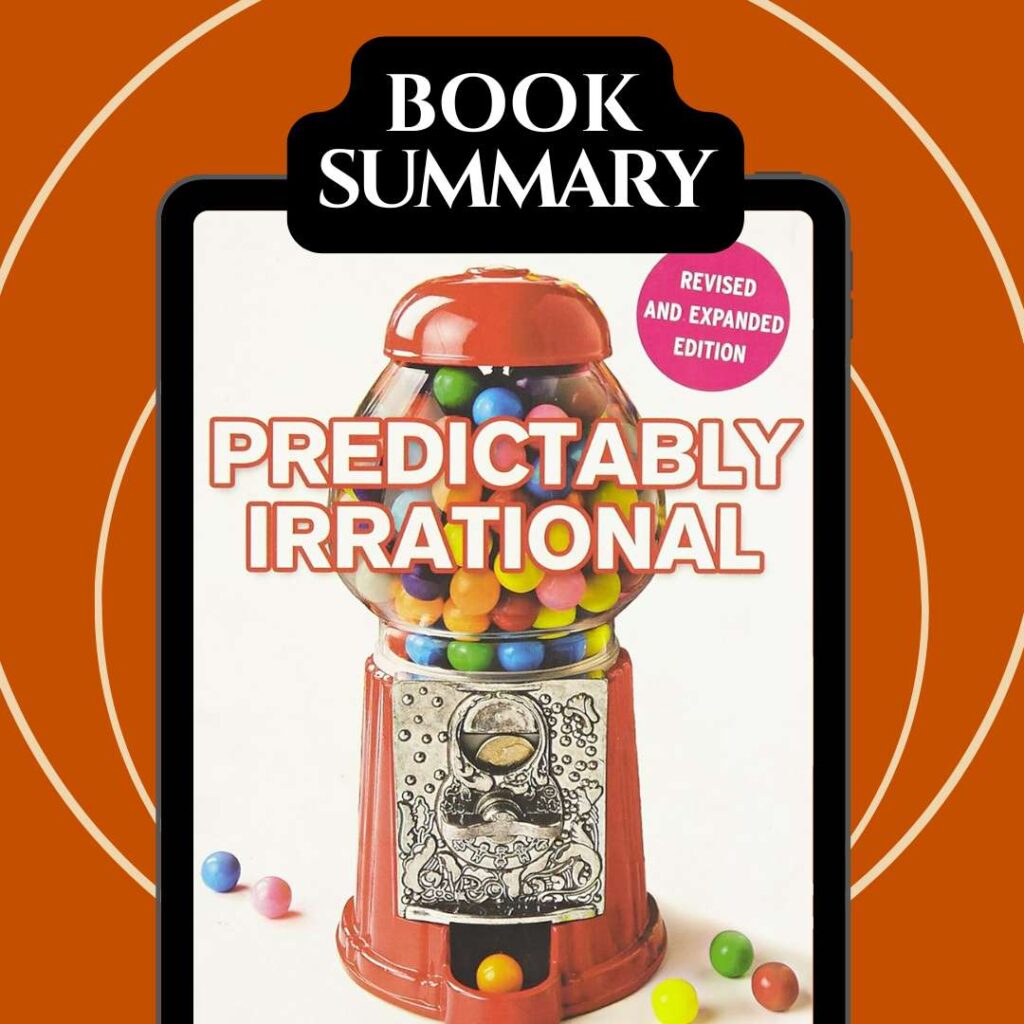Predictably irrational summary
Predictably Irrational, as defined by author Dan Ariely, delves into the fascinating realm of human behavior, showcasing how individuals often make irrational decisions despite seemingly logical circumstances. Ariely, a renowned behavioral economist, crafts a narrative that unravels the intricacies of the human mind, shedding light on the various cognitive biases and heuristics that influence our decision-making processes. The underlying purpose of the book is to challenge the conventional notions of rationality by uncovering the hidden forces that shape our everyday choices.

Table of Contents
The Psychology of Decision-Making
1. Cognitive Biases and Heuristics
- Confirmation Bias: The tendency to seek out information that validates preexisting beliefs, leading to distorted perceptions and flawed decision-making.
- Anchoring: The cognitive bias where individuals rely heavily on the first piece of information presented when making subsequent judgments.
- Loss Aversion: The psychological principle that individuals are more averse to losses than they are inclined towards gains, impacting decision outcomes.
- Endowment Effect: The cognitive bias wherein individuals place a higher value on items they own, influencing their valuation and decision processes.
2. Influence of Emotions on Decision-Making
Emotions play a significant role in shaping our decisions, often guiding us towards choices that are not entirely rational. The interplay between emotions and cognition can lead to impulsive behaviors and biased judgments, highlighting the complexities of human decision-making.
3. Components of Irrational Behavior
Irrational behavior stems from a myriad of factors, including cognitive biases, emotional responses, and social influences. Understanding these components is crucial in unraveling the mysteries behind why humans deviate from traditional notions of rationality.
The Power of Social Norms
1. Impact of Social Influence
Social norms exert a powerful influence on individual behavior, dictating societal conventions and expectations that guide decision-making processes.
2. Conformity and Peer Pressure
The desire to conform to social norms and the pressure exerted by peers can lead individuals to make choices that may not align with their personal beliefs or preferences.
3. Examples of Social Norms in Decision-Making
From fashion trends to consumption patterns, social norms play a pivotal role in influencing our decisions, often shaping our choices in ways that may not be immediately apparent.
Behavioral Economics and Decision Theory
Behavioral economics combines insights from psychology and economics to understand how individuals make decisions. Decision theory refers to the study of rational and irrational decision-making processes. In Predictably Irrational, Dan Ariely delves into the various behavioral biases that influence our choices.
1. Cognitive Psychology and Behavioral Biases
- Confirmation Bias: People tend to seek information that confirms their preconceptions, leading to biased decision-making.
- Availability Heuristic: Decisions are influenced by the information readily available in one’s memory.
- Loss Aversion: Individuals are more averse to losses than they are motivated by equivalent gains.
- Anchoring: The tendency to rely heavily on the first piece of information encountered when making decisions.
2. Prospect Theory and Emotional Intelligence
- Prospect Theory: People make decisions based on perceived gains and losses rather than final outcomes.
- Emotional Intelligence: Understanding and managing emotions play a pivotal role in decision-making processes.
3. Influence Tactics in Behavioral Economics
- Social Proof: Individuals look to others’ actions to determine the correct behavior in a given situation.
- Nudge Theory: Small changes in how choices are presented can significantly influence decision outcomes.
Consumer Behavior and Heuristic Reasoning
Consumers often rely on heuristics, or mental shortcuts, when making purchasing decisions. Understanding these psychological mechanisms is crucial to marketing strategies and product positioning.
1. The Role of Social Norms in Consumer Behavior
- Conformity: Individuals conform to societal norms to avoid social rejection or disapproval.
- Choice Architecture: Designing choice environments can guide consumers towards specific decisions.
2. Pricing Strategies and Consumer Perception
- Anchoring and Adjustment: Initial price perceptions can anchor subsequent judgments.
- Endowment Effect: People ascribe higher value to items they own compared to identical items they do not own.
3. The Influence of Free Products on Decision-Making
- Understanding the allure of free offers and how they impact consumer behavior.
- Decision Fatigue: Continuous decision-making can deplete cognitive resources, leading to suboptimal choices.
Applying Behavioral Economics Principles in Daily Life
Understanding the principles of behavioral economics can empower individuals to make better decisions in various aspects of their lives. Ariely’s insights offer practical strategies for overcoming irrational tendencies.
1. Strategies for Rational Decision-Making
- Awareness: Recognizing common biases can help individuals mitigate their effects.
- Behavioral Interventions: Implementing small changes in decision environments can lead to more favorable outcomes.
2. Embracing Bounded Rationality
- Recognizing the limitations of human rationality and working within these constraints.
- Choice Overload: When faced with too many options, individuals may experience decision paralysis.
3. Enhancing Judgment and Decision-Making Skills
- Practicing better judgment through critical thinking and self-reflection.
- Neuroeconomics: Studying brain activity associated with economic decision-making.
FAQs for Predictably Irrational Summary
What is the main concept behind Predictably Irrational
Predictably Irrational explores the irrational behaviors and decisions that individuals make, highlighting how our cognitive biases and emotions influence our choices.
Who is the author of Predictably Irrational?
The book is authored by Dan Ariely, a renowned behavioral economist who delves into the psychology of decision-making and irrational behavior.
How do social norms impact decision-making?
Social norms play a significant role in influencing our choices by affecting our conformity to peer pressure and societal expectations, ultimately shaping our behavior.
What is the significance of pricing and value perception in decision-making?
Understanding pricing strategies and how consumers perceive value can shed light on how businesses can influence consumer choices through tactics like anchoring and free offers.
How can one overcome irrationality in decision-making?
By employing strategies rooted in behavioral economics principles and increasing awareness of our cognitive biases, individuals can make more informed and rational choices in various aspects of life.
Conclusion
In conclusion, Predictably Irrational offers valuable insights into the psychological underpinnings of decision-making and the irrational tendencies that influence our choices. By understanding the power of social norms, pricing strategies, expectations, and other factors, individuals can gain greater control over their decisions and strive towards more rational and intentional behaviors. Embracing the principles of behavioral economics and implementing strategies to counteract irrational biases can lead to improved decision-making outcomes in both personal and professional spheres.
Discover marketing services, interviews & publishing tools at SharingStories.



